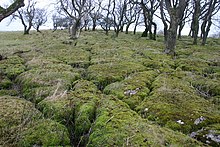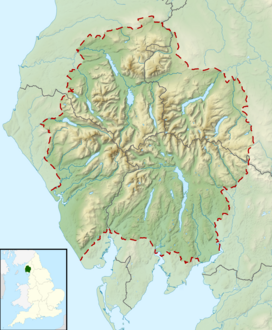Clints Crags is a small fell in the north of the English Lake District near Blindcrake, Cumbria. It has its own chapter in Alfred Wainwright's The Outlying Fells of Lakeland. He describes a circular walk from Blindcrake, and laments that at the time of writing (1974): "This is a walk on public footpaths, but until somebody removes the barbed wire and other obstacles to legitimate progress it can be recommended only to gymnasts."[1] It reaches 804 feet (245 m). Since the time of writing the barbed wire has been removed and the path to the summit is clear of obstructions.
| Clints Crags | |
|---|---|
 | |
| Highest point | |
| Elevation | 245 m (804 ft) |
| Prominence | 53 m (174 ft) |
| Parent peak | Binsey |
| Listing | Outlying Wainwright |
| Coordinates | 54°42′22″N 3°17′42″W / 54.706°N 3.295°W |
| Geography | |
| Parent range | Northern Fells |
| Topo map | OS Landranger 96 |
Clints Crags offers a pleasant and easy stroll to the summit from the village of Blindcrake. The gradient of the crags is much steeper rising north out of the Isel valley, however there are no footpaths to the crags from the valley bottom. There is an old limestone quarry near the summit of the hill, this is now an SSSI, being home to a rare species of newt that breeds in the old quarry lakes. The summit is a large expanse of limestone outcrops and pavement, which is also a designated SSSI. The fragile limestone habitat supports various rare calcareous species of flora and fauna. More can be found on https://clintscrags.co.uk

Other places of the same name
editThere are other places called Clints Crags in Wensleydale, North Yorkshire (just south of Leighton Reservoir)[2] and above Ireshopeburn in Weardale, County Durham.[3]
References
edit- ^ Wainwright, A. (1974). "Clints Crags". The Outlying Fells of Lakeland. Kendal: Westmorland Gazette. pp. 204–205.
- ^ "Clints Crags". Geograph. Retrieved 6 May 2012.
- ^ "Ireshope Burn at Clints Crags, with cave". Geograph. Retrieved 6 May 2012.
